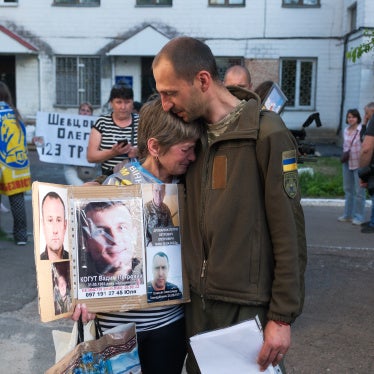(Beirut) – Lebanon’s government should resist increasing calls by politicians to resume executions and instead work to abolish the practice, Human Rights Watch said on the occasion of the World Day against the Death Penalty, on October 10, 2010. Lebanon has not executed anyone since 2004, but many Lebanese leaders have called recently for carrying out the death penalty against persons convicted of spying for Israel and of belonging to certain armed Jihadist groups.
President Michel Suleiman, who under Lebanese law must sign a death sentence before it is carried out, said on July 1 that he will approve death penalties issued by military tribunals that are trying the vast majority of spying and terrorism cases. The Hezbollah leader, Sayyid Hassan Nasrallah, called for the speedy application of death sentences against anyone convicted of collaborating with Israel. Other Lebanese political figures have added their voices in support.
“Lebanon has legitimate security concerns but resuming executions is wrong and will not make the country safer,” said Nadim Houry, Beirut director at Human Rights Watch. “Study after study suggests that capital punishment does not deter crime more than other sanctions.”
According to government information, Lebanon has arrested more than 150 people on suspicion of spying for Israel since April 2009, when the Lebanese security services began a nationwide crackdown on alleged spy rings. So far this year, military tribunals have sentenced at least three of those detained to death, and more death penalty sentences are expected in the coming months. Dozens of members of Fatah al-Islam, an armed Jihadist group that fought the Lebanese army in 2007, still await trial on terrorism-related charges and could also face the death penalty if convicted.
On October 10, 2008, Justice Minister Ibrahim Najjar submitted to the Council of Ministers a draft law abolishing the death penalty and replacing it with life imprisonment with hard labor. Its passage is unlikely in the present political climate surrounding the current cases alleging spying for Israel.
“The death penalty is making a comeback just when Lebanon was on the verge of discussing banning the practice,” Houry said. “It is time for those voices opposed to the death penalty to be heard again.”
Human Rights Watch opposes the death penalty in all cases as a violation of fundamental rights – the right to life and the right not to be subjected to cruel, inhuman, and degrading punishment.
Human Rights Watch is also concerned that the trials of those facing the death penalty do not meet international fair trial standards. A number of detainees held by Military Intelligence and the Information Branch of the Internal Security Forces – the two main security agencies investigating cases of espionage and terrorism – have told Human Rights Watch that security officers beat and tortured them during interrogation to extract confessions. The Lebanese authorities regularly deny all allegations of torture, but to Human Rights Watch’s knowledge, no investigations into these allegations have been conducted.
In addition, there is no civilian oversight of Lebanon’s military tribunal. While its trials are theoretically open to the public, in practice access is very limited, with family members and independent observers regularly denied entry. Cases before the Justice Council – a special criminal court examining crimes against state security referred by the Cabinet – are even more problematic, as there is no right to appeal.
“If executions resume in Lebanon, there is a very real possibility that the state will execute innocent people,” Houry said.







